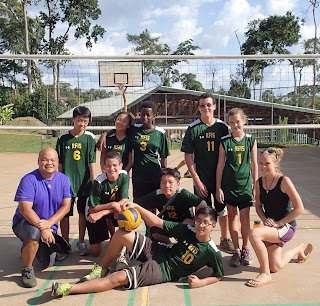I [Chris] have had a really interesting question lobbed at
me a couple of times recently. The
question, though worded differently each time, is basically something like
this: is it harder or easier to live
without so many modern conveniences when you're in Cameroon? The question points to an obvious implicit
dichotomy. On one side, you have life in
Cameroon without ubiquitous
technology but with many things that
have to be done manually – things that we take for granted here in the US. On the other, you have life with every
conceivable modern convenience which then leads to having so much more to
do/worry about.
My answer has essentially been, “It’s harder
everywhere.” That doesn’t make much
sense, although it’s the truest answer I can give.
Honestly, it’s at the core of some struggles we’ve had in
adjusting to life in the US. And to be
clear, struggles of adjustment in the US are mostly between the ears – stuff
that’s hard to find a place for and comprehend.
So on the one hand, when we’re in Cameroon, we see a hard
life for so many of our friends. We have
friends, some in the village, some in the city, that live in conditions that
our American friends could not imagine.
There are struggles in child-rearing – the most significant of which is
finding money for school fees. There is
not guaranteed public education to benefit from and the fees a family with
three children must pay can take about a month’s worth of income for someone
from the working middle-class. Lower
middle-class and below? Education might
be rationed within the family (selecting which child will be educated) or not
even become a part of their life.
There are struggles in the day to day. Many people in Cameroon, again both in the
city and in villages, struggle to have clean drinking water. As a result, families may have a lot of
illness which they probably won’t have the money to treat and the cycle just
spirals.
Also, imagine living in a home with a curtain for a front
door, basic cloth curtains in the windows (no glass or screens), no indoor
plumbing, and an outdoor kitchen. There
you have a fairly average home in our city.
And this is just scratching the surface. Frankly, when I consider our “struggles” after considering struggles of the average person
living around me in our context in Africa, I feel like a spoiled brat. Our lack of a dishwasher, our two bathrooms
that only have ¾ height wall between them, having to spend most of a day to do
the week’s grocery shopping at several different stores, power outages a few
times a week, etc. are difficult for us coming from the US, but less than a drop
in the bucket compared to what our neighbors contend with daily.
So yes, life is hard in
Cameroon. But that doesn’t mean it’s
easy in the US.
Having so much modern convenience means a fuller docket in
daily life. There are so many activities
to chase our kids to. There are
appointments to make and then keep.
There are so many technological things to catch up on and keep up
with…in part because our kids needed “devices” to use in the classroom (it was
a shock to come back here to find that just about every middle school kid has a
better phone than me). There’s learning
Google Classroom in order to help the kids with homework. It goes on and on!
And then came the need to manage some of our financial
matters and take care of our retirement funds while we’re here. And the management of our fundraising and all
of the people and churches that are implied in all of that. The sheer number of “irons in the fire” has
quickly become overwhelming.
There are so many things to take care of on so many angles
that life here in the ultra-modern world…is hard. But beyond the visibly difficult aspects of
life in the US is that we make it worse by covering it up. It seems that in Western culture, all of the
conveniences that we have and use mostly serve to mask the frailty of our
existence and put “makeup” on the real struggles that are deep in each of our
hearts.
It can be a mess in our heads, living in both worlds
simultaneously. We’re still in touch
with life in Cameroon and wanting to be back there in 8 months. But we’re here now with feet in both worlds
and not completely hanging tough and savvy in either one. Both the heart and the head are struggling to
manage both and have proper perspective.
Being bi-cultural is great, but it has exposed the blind spots that we
had in our understanding of this life and how certain struggles were hiding
behind the method of life.
My prayer is that this season of advent will usher us toward the understanding of the greatest gift ever given: Jesus, God’s gift that gives us the opportunity to dwell in fullness forever.

















